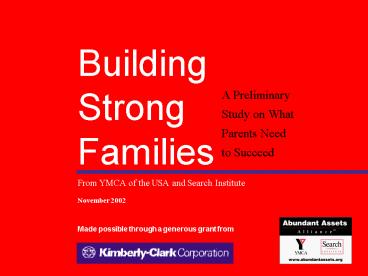Building Strong Families - PowerPoint PPT Presentation
1 / 26
Title:
Building Strong Families
Description:
From YMCA of the USA and Search Institute. November 2002 ... YMCA of the USA/Search Institute. Parents with a Strong Partner Relationship Are More Likely to. ... – PowerPoint PPT presentation
Number of Views:406
Avg rating:3.0/5.0
Title: Building Strong Families
1
Building Strong Families
- A Preliminary Study on What Parents Needto
Succeed
From YMCA of the USA and Search
Institute November 2002 Made possible through a
generous grant from
2
Scope of the Study
- Telephone poll of 1,005 parents.
- Interviews with 23 parents and community leaders
that work with families. - Input from a national advisory group of
researchers and other parenting experts. - Examination of other research on effective
parenting and family strengths.
3
Overview of 5 Key Findings
- Most parents are going it alone
- The importance of the partner relationship
- Feeling successful most of the time
- Ongoing challenges of parenting
- Parents value informal supports
4
Finding 1Most Parents Are Going It Alone
- Most parents surveyed are going it alone in
their parenting, not actively seeking parenting
support and encouragement from family, friends,
or community resources. When they do seek
support, they are most likely to turn to family
and friends.
5
How Many Sources of Support?
6
Most Common Sources of Support
7
Finding 2Importance of Partner Relationship
- Parents who report having an excellent
relationship with a spouse or parenting partner
are more likely than others to feel successful as
parent. Yet only about half of the parents
surveyed indicated that their relationship with
their partner was excellent.
8
Parents with a Strong Partner Relationship Are
More Likely to . . .
- Often feel successful as parents
- Experience fewer challenges as parents
- Feel confident in dealing with challenges
- Seek support from others
- Be open to more types of help
- Engage in asset-building actions
9
Quality of Partner Relationship
10
Finding 3Feeling Successful Most of the Time
- Parents see their success in both what they do
and in their childrens lives and choices. Most
parents surveyed say they feel successful most of
the time, and they report doing many things that
contribute to their childs healthy development.
11
How Often Parents Feel Successful
12
Parents Asset-Building Actions (Daily)
13
Finding 4Ongoing Challenges of Parenting
- Though most parents in this study feel
successful as parents, they still face obstacles
and challenges. Job demands, sibling rivalry,
overscheduling, and the familys financial
situation are the factors parents most often say
make parenting harder.
14
What Makes Parenting Harder?
(Very much or somewhat)
15
Dealing with Daily Challenges
16
Sources of Dissatisfaction
(Very much or somewhat)
17
Finding 5Parents Value Informal Supports
- Parents in this poll value many simple ways that
others can support them as parents, including
affirmation for their parenting, other trusted
adults spending time with their kids, advice from
trusted professionals, and talking with other
parents.
18
What Would REALLY Help?
(Very much or somewhat)
19
Ideas for Parents
- Celebrate the ways you help your child grow up
healthy, caring, and responsible. - Find other parents you can connect with and learn
from. - Take time to focus on strengthening your
relationship with your spouse or partner. If you
dont have a partner, find friends and relatives
who can be strong supports for you and your
children.
20
Ideas for Children and Teenagers
- Think about ways you can help reduce the
bickering with your siblings. - Tell your parent(s) when theyre doing things
right and when you appreciate them. - Take responsibility for helping out at home.
- As you grow older, take time to learn new things
about your parent(s).
21
Ideas for Organizations
- Affirm parents in what theyre already doing
right. - Ask parents for ideas on how your organization
could support them more. - Give parents opportunities to connect and learn
from each other. - Offer parents learning opportunities that focus
on how they build strengths.
22
Ideas for Communities
- Sponsor and support community-wide,
intergenerational events for families. - Find ways to affirm and celebrate family
strengths - Ask parents to give input into what your
community can offer for families. - Create and distribute a directory of resources
and opportunities for families in your community.
23
Ideas for Policy Makers
- Recognize the power in creating policies that
strengthen families rather than deal only with
their problems. - Use policies and funding to reinforce the natural
and existing resources for parents, such as
neighbors, extended family, schools, and
communities.
24
Dialogue Questions for Parents
- What parts of this study ring true for you? How
is your experience different from what the study
found? - What are things you like most about your family?
What do you see as your strengths? - Who are people who give your family a lot of
support and encouragement? If there arent any,
who might you know who could become such a
support?
25
Dialogue Questions for Family-Supporting People
and Organizations
- In what ways are the findings from this study
similar to or different from the realities in
your own community? - How can you include parents in your planning
efforts? - What are successes youve had or seen in
supporting and encouraging parents? - What new ideas does this study spark for you?
26
Resources from the Study
- Available at www.abundantassets.org
- Building Strong Families Summary Report
- Building Strong Families In-Depth Report
- Building Strong Families Presentation
- Building Strong Families Insights from Research
electronic newsletter (free) - YMCA Strong Families Zone www.ymca.net
- Asset-Building Resources www.search-institute.org































